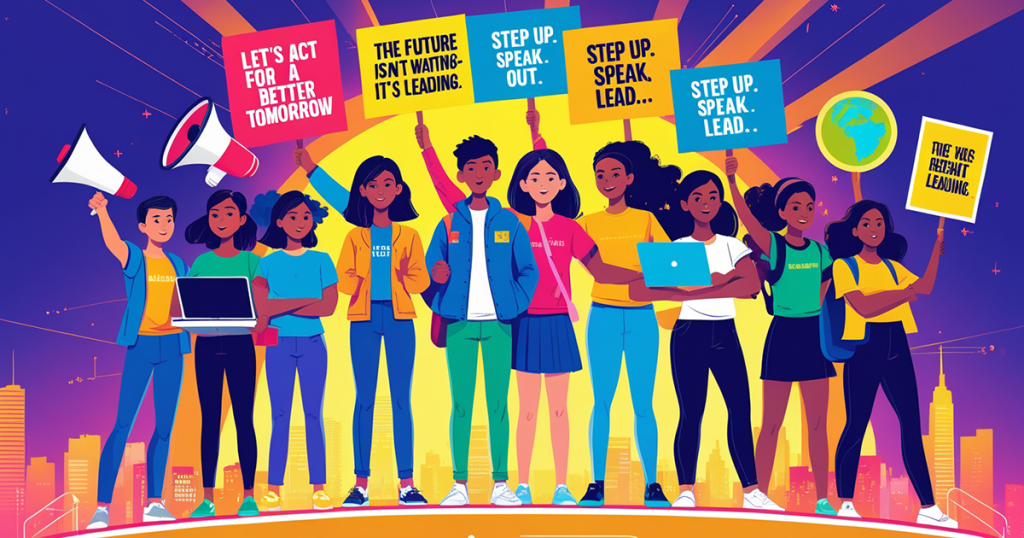Why Youth Leadership Matters Now More Than Ever
A New Generation of Changemakers
From Traoré’s anti-colonial stance to Greta Thunberg’s climate activism and Malala’s education crusade, young voices are proving that leadership isn’t about age—it’s about courage, innovation and commitment to change. In an era of complex global crises, their fresh perspectives and digital-native strategies make youth leadership not just valuable, but essential.
Ibrahim Traoré, Greta Thunberg, Malala Yousafzai, and David Hogg have become synonymous with courage, innovation, and relentless advocacy. But they are not alone, millions of young people worldwide are stepping up, proving that youth leadership is not just the future, it’s transforming the present.
In a time of rapid technological advancements, global crises, and shifting societal norms, the perspectives of young leaders are more valuable than ever. But why does youth leadership matter so much right now? And how can society better support and amplify these voices?
Why Youth Leadership is Critical in Today’s World
1. Fresh Perspectives on Global Challenges
Young leaders approach problems differently unburdened by traditional systems, they think creatively and disruptively. Whether it’s advocating for climate action, mental health awareness, or digital rights, youth bring urgency and innovation to the table.
- Example: The Fridays for Future movement, started by Greta Thunberg, mobilized millions of students worldwide to demand climate policy changes.
2. Digital Natives Driving Change
Today’s youth are the first true digital natives to understand social media, technology, and global connectivity better than any previous generation. This allows them to:
- Organize movements rapidly (e.g., #BlackLivesMatter, #MeToo).
- Crowdfund social initiatives.
- Use platforms like TikTok and Instagram to spread awareness.
3. Challenging the Status Quo
Young leaders like Traoré exemplify the willingness to confront entrenched systems. As Burkina Faso’s interim president, he:
- Rejected foreign military bases in his country
- Championed African self-sufficiency in food and security
- Connected with citizens through raw, unfiltered social media communication
This mirrors how youth worldwide are demanding accountability from traditional power structures
4. A Demand for Equity and Inclusion
Young leaders are challenging outdated power structures, advocating diversity, fairness, and representation in politics, business, and media. They refuse to accept “the way things have always been” and push for systemic change.
- Example: Malala Yousafzai’s fight for girls’ education sparked global policy shifts.
The Real-World Impact of Youth Leadership
Young leaders aren’t just talking—they’re creating tangible change. Here’s how:
- Influencing Policy & Legislation
- Youth-led campaigns have pressured governments to adopt stronger climate policies.
- Student activists have shaped gun control debates in the U.S. and beyond.
- Entrepreneurship & Innovation
- Teenagers and young adults are launching startups that solve real-world problems (e.g., Boyan Slat’s Ocean Cleanup).
- Young tech innovators are leading advancements in AI, sustainability, and healthcare.
- Peer Mentorship & Community Building
- Youth-led mentorship programs help bridge education gaps.
- Online communities provide safe spaces for mental health support and activism.
How Can We Support the Next Generation of Leaders?
For youth leadership to thrive, society must provide opportunities, platforms, and mentorship. Here’s how:
1. Amplify Their Voices
- Feature young leaders in media, conferences, and decision-making spaces.
- Encourage schools and organizations to include youth in policy discussions.
2. Invest in Leadership Development
- Support programs like UN Youth, and local youth councils.
- Teach leadership skills (public speaking, critical thinking, collaboration) in schools.
3. Provide Mentorship & Resources
- Experienced leaders should guide and sponsor young talent.
- Offer grants, scholarships, and incubators for youth-led initiatives.
The Future is Young—And It’s Here Now
Youth leadership isn’t just a trend—it’s a necessary force for progress. By empowering young voices today, we ensure a more innovative, equitable, and sustainable tomorrow.

